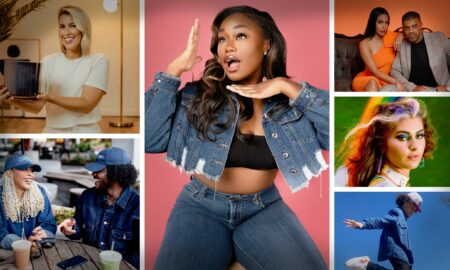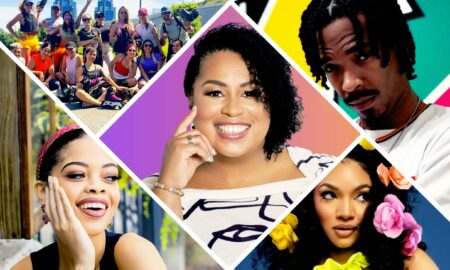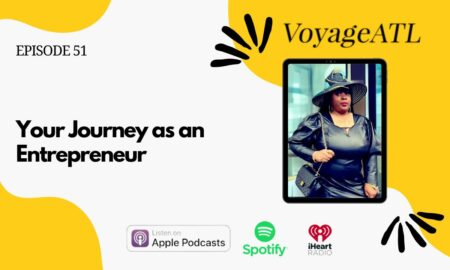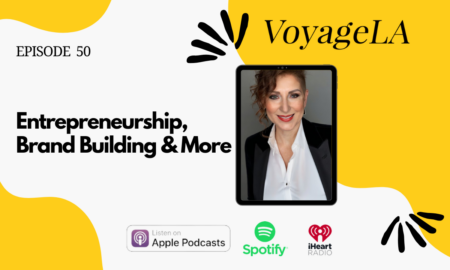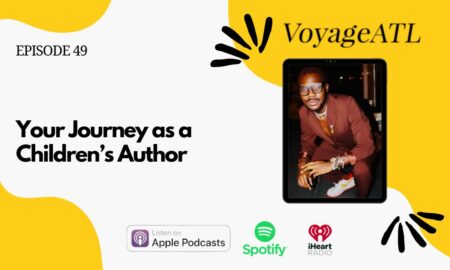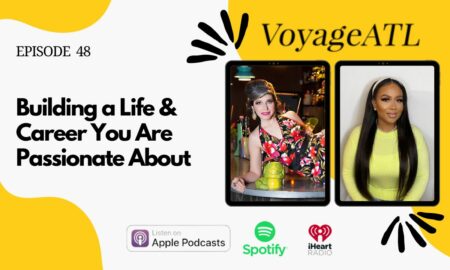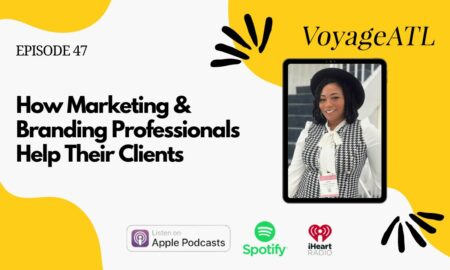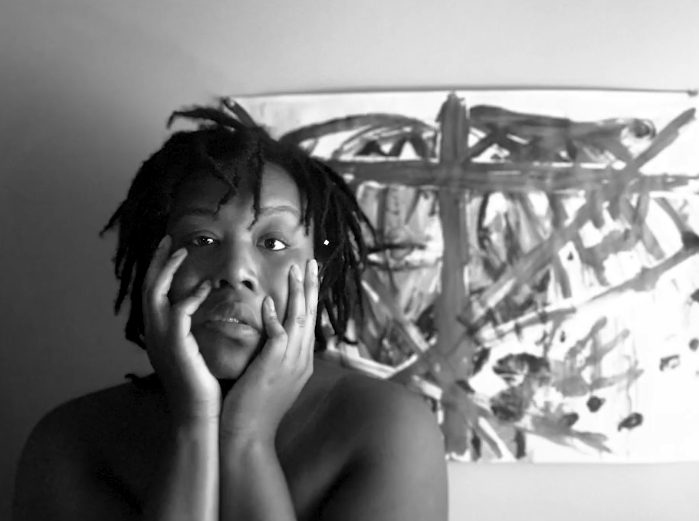

Today we’d like to introduce you to Nay Jones.
Nay, can you briefly walk us through your story – how you started and how you got to where you are today.
I recently realized that I was actually a pretty sad kid. Everything around me was fine. I had a roof over my head. My family was and still is very loving and supportive. But I was lonely. We moved a lot for various reasons so I didn’t really have many friends. I still don’t really have a place that I feel entirely comfortable calling home. Atlanta is the closest thing that I have to a home. I was also the only black kid surrounded by a bunch of white kids so I got made fun of pretty often—My mom doesn’t know this but I guess she will now haha. I was always buried in a book, creating some imaginary world with my toys, or watching VHS tapes to avoid the things going on around me. I was always dreamy and a little disconnected from the world. It took a lot for me to open up to anyone that wasn’t an immediate family member. I was pretty quiet until we moved from Las Vegas to Atlanta in 2006. I was only eight then. My mom explained to me that we’d be living here pretty permanently so I saw it as my chance to finally make friends. But all the years of loneliness turned into raw anger. I went from being quiet to just being obnoxiously rude. I was so used to being platonically lonely that I always expected the few friends that I did have to eventually leave. So I tried to push them away before they had the chance. I wouldn’t recommend this method. I was still lonely and it was still just me and my dream world all the way until college. A lot of people are really surprised when I tell them that because I’m like the nicest person in the world now lol. This Janay is a lot different than young Janay. I’m proud of her. I’m proud of me.
I’ve always been creatively inclined. I’ve loved movies my whole life and I’ve always wanted to make one. For a long time I worked on other people’s projects. Most prominently I work on PR and creative direction for Raianna Brown and Komansé Dance Theater. Komansé gave me my creative start and sparked this fire in me that made me feel like I can finally do the things that I’m destined to do. I had the harsh realization that the only thing stopping me was me. When I turned 21, I had a conversation with Raianna that kind of kickstarted everything I have now. She noticed that I’d stopped making stuff and gave me a challenge to make something fully produced in a month. With that, I started my YouTube in April of 2018 with my first show, Dark Matter: A Docuseries on the Inner Die-alogue of the Black Mind. It’s a surreal documentary-series that focuses on the mental health of black young adults. This show is important to me because I’ve had several serious trials just with my own mental health. Making the YouTube channel was a really pivotal moment for me because I’ve always wanted to make films and various other visuals. It was the first artistic thing that I owned and I finally felt comfortable enough to call myself an artist. I was suffering from a lot of imposter syndrome up until that point because I felt as though I was an artist but I hadn’t made anything yet. I felt like I didn’t deserve the label. All of this is to say that imposter syndrome is trash and if you want to be an artist, just be one. A lot easier said than done obviously.
Has it been a smooth road?
It hasn’t been a smooth road at all. I don’t think that any artist has a smooth road. A lot of my sadness over the past couple of years fully stemmed from me not doing the things that I’m passionate about. I’ve known that I love movies for my entire life yet I spent most of my life trying to convince myself that it was just some sort of pipe dream. I convinced myself that it was impossible to create a career in film. I shot down all of my dreams myself. Nobody else even had to do it. It was literally killing me. I spent all of my adolescent years trying to harm myself in various ways and I’ve been in and out of the mental hospital three times in the past three years for suicidal ideation. To put things into perspective, my last hospitalization was only a year ago on October 17, 2018. This last visit brought my life to a really dramatic stop. I’ve been depressed since I was 11 years old but something about this episode was a lot different. I was diagnosed with Bipolar II Disorder and I received the most clarity I’d ever had in my life with just one new label. A lot of my issues over the past ten years suddenly made sense. I realized that I was only 21 and I’d spent half of my life trying to end it. I had to take a long reflective period to figure out what I was even living for anymore. I went through a lot of intensive therapy and took back my mental space. That’s when I decided to stop being a spectator to my own life. Now I’m in school for film and I have several projects that I love because they’re the most authentic pieces of me. Don’t get me wrong, I’m not some miraculously healed self-help guru. I still have bad days often. But the days before this change were a hell of a lot worse. We hear it all the time but just in case you need to hear it again, healing isn’t linear. It’s an intensive journey where you have to peel back endless layers of internalized trauma that you didn’t even realize you had. Or at least that’s been my experience.
Please tell us more about your art.
I’m a visual artist of sorts that focuses on black existence through an afro-surrealist/futurist lens. I paint, write, and film. I like to mix all of the various mediums however, my primary medium is film. I’m mostly a documentarian but I’m also deeply interested in narrative film. Simply put, I just try to capture black people existing on camera. It’s hard though because you literally can’t make this shit up. The experiences that black people have are unique and it’s hard to put any sort of words to them. So I use film to at least try and give a visual to the feelings that we somehow all share. I’m most proud of my two documentary series. The first one is Dark Matter. It’s a love child of all of my drastic mental health experiences. The show explores the mental health of black 20-somethings. It’s a show for those black kids and adolescents who just woke up one day and felt sad and didn’t know who to turn to. Dark Matter champions vulnerability and the joy and freedom that is the direct result of it. It isn’t so much interested in listening to people’s woes more so than listening to how they grew from them or are just managing. I want to give black young adults the space to share as much or as little as they want. It was also very important to me that Dark Matter always stay on a platform where people can view it for free. This is because a large issue with black mental health is monetary accessibility. Dark Matter is a resource and I want to eliminate as many obstacles as I can so that people can use it. The second show is Self Poor Traits. The show is a docu-series about my flaws where I explore all of my shortcomings through portraiture of various mediums. It’s a love letter to myself. I’m broadcasting all of the aspects of myself that I constantly try to erase from my existence. I’m reversing the crime of dehumanization that I have acted out against myself. It’s a healing project.
A lot of the ideology present in my work is inspired by people like Arthur Jafa, Solange, Spike Lee, Ava Duvernay, James Baldwin, etc. This list goes on and on but it’s primarily shaped by those who’ve made leaps and bounds in the realm of the Black Aesthetic. I think that what sets me apart from others is that I’m deeply interested in capturing black people on camera outside of the context of the white gaze. Filming documentaries about black people is interesting just because film and visuals have the capacity to be used against us in a violent way. For instance, think about an evening on the news circuit or the characterization of black people in popular films. The visuals that the world mostly promotes of black people are often internally meant to keep us oppressed in some way. This is changing with the rise of more black—specifically women—filmmakers, but we still have a long way to go. I’m excited to see the change and I make sure to center it in all of my work so that people can just feel comfortable being themselves when they’re in front of my camera.
Is our city a good place to do what you do?
Atlanta is an amazing place for film. It’s a beautiful city full of people who understand the necessity of dreams and making them a reality. There’s no other place like it. This is the creative space to be. It’s the black mecca. Only greatness comes out of here. That’s why they’re trying to take it away.
Contact Info:
- Website: https://www.youtube.com/channel/UC3yzPGp3rzRv1dQ1nfl-2nQ
- Email: nay.jones.x@gmail.com
- Instagram: https://www.instagram.com/nayjonesx/
- Other: https://linktr.ee/nayjonesx







Image Credit:
All images by Nay Jones. Various stills from Aforementioned Documentary Work
Suggest a story: VoyageATL is built on recommendations from the community; it’s how we uncover hidden gems, so if you or someone you know deserves recognition please let us know here.

